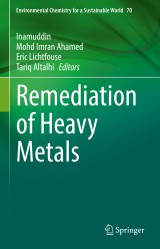Details

Remediation of Heavy Metals
Environmental Chemistry for a Sustainable World, Band 70
|
149,79 € |
|
| Verlag: | Springer |
| Format: | |
| Veröffentl.: | 10.11.2021 |
| ISBN/EAN: | 9783030803346 |
| Sprache: | englisch |
| Anzahl Seiten: | 454 |
Dieses eBook enthält ein Wasserzeichen.
Beschreibungen
The book presents recent remediation techniques for heavy metal contamination in wastewater, with a focus on recently-developed and sustainable materials such as metal oxides and their composites, two-dimensional materials, organic-inorganic ion exchange materials, nanomaterials, bagasse, and olive-oil waste chelating materials. Chapters also describe the analysis of heavy metals, membranes for water treatment, sources and impact of heavy metals and opportunities and challenges in heavy metal remediation.
<p>Chapter 1 Analytical methods for the determination of heavy metals in water.- Chapter 2 Olive-oil waste for the removal of heavy metals from wastewater.- Chapter 3 Metal oxide composites for heavy metal ions removal.- Chapter 4 Two-dimensional materials for heavy metal removal.- Chapter 5 Membranes for heavy metals removal.- Chapter 6 Metal oxides for removal of heavy metal ions.- Chapter 7 Organic-Inorganic Ion Exchange Materials for Heavy Metal Removal from Water.- Chapter 8 Low-cost technology for heavy metal cleaning from water.- Chapter 9 Use of nanomaterials for heavy metal remediation.- Chapter 10 Ecoengineered approaches for the remediation of polluted river ecosystems.- Chapter 11 Ballast water definition, components, aquatic invasive species, control and management and treatment technologies.- Chapter 12 Source, pollution and remediation of carcinogenic hexavalent chromium from industrial, mining effluents.- Chapter 13 Pesticides in Drinking Water and Removal Techniques.-Chapter 14 Opportunities and challenges in heavy metal removal from water.- Chapter 15 Modification of Bagasse for Heavy Metal Removal form Water.- Chapter 16 Chelating materials for the removal of heavy metals from water.- Chapter 17 Sources of heavy metals pollution.</p><br>
<div>Dr. Inamuddin is an assistant professor at the Department of Applied Chemistry, Zakir Husain College of Engineering and Technology, Faculty of Engineering and Technology, Aligarh Muslim University, Aligarh, India. He has extensive research experience in multidisciplinary fields of analytical chemistry, materials chemistry, electrochemistry, renewable energy, and environmental science. He has worked on different research projects funded by various government agencies and universities and is the recipient of awards, including the Department of Science and Technology, India, Fast-Track Young Scientist Award and the Sir Syed Young Researcher of the Year Award 2020 from Aligarh Muslim University. He has published about 190 research articles in various international scientific journals, 18 book chapters, and 145 edited books with multiple well-known publishers. His current research interests include ion exchange materials, a sensor for heavy metal ions, biofuel cells, supercapacitors, and bending actuators.</div><div><br></div><div><br></div><div>Dr. Mohd Imran Ahamed is working as Research Associate at the Department of Chemistry, Aligarh Muslim University (AMU), Aligarh, India. He received his B.Sc. (Hons) Chemistry and Ph.D. (Chemistry) degrees from AMU. He has completed his M.Sc. (Organic Chemistry) from Dr. Bhimrao Ambedkar University, Agra, India. He has published several research and review articles in various international scientific journals. He has co-edited 47 books of international repute. His research work includes ion-exchange chromatography, wastewater treatment, and analysis, bending actuator and electrospinning.</div><div><br></div><div>Dr. Eric Lichtfouse is a professor of environmental chemistry and scientific writing at Aix Marseille University and Xi’an Jiaotong University, and Chief Editor and co-founder of the journal Environmental Chemistry Letters. He has invented carbon-13 dating following the discovery of various temporal pools of a singleindividual organic substance in soils. He has published the book Scientific Writing for Impact Factors, which includes a new tool – the Micro-Article - to identify the novelty of research results. He got the analytical chemistry prize from the French Chemical Society, the grand prize of the Universities of Nancy and Metz, and a journal citation award by the Essential Indicators. He is world XTerra vice-champion and ITU cross triathlon world bronze medal in the age category.</div><div><br></div><div>Tariq Altalhi, PhD, joined the Department of Chemistry at Taif University, Saudi Arabia as Assistant Professor in 2014. He received his doctorate degree from University of Adelaide, Australia in the year 2014 with Dean's Commendation for Doctoral Thesis Excellence. He was promoted to the position of the head of Chemistry Department at Taif university in 2017 and Vice Dean of Science college in 2019 till now. In 2015, one of his works was nominated for Green Tech awards from Germany, Europe’slargest environmental and business prize, amongst top 10 entries. He has co-edited various scientific books. His group is involved in fundamental multidisciplinary research in nanomaterial synthesis and engineering, characterization, and their application in molecular separation, desalination, membrane systems, drug delivery, and biosensing. In addition, he has established key contacts with major industries in Kingdom of Saudi Arabia.</div><p></p>
<p>The book presents recent remediation techniques for heavy metal contamination in wastewater, with a focus on recently-developed and sustainable materials such as metal oxides and their composites, two-dimensional materials, organic-inorganic ion exchange materials, nanomaterials, bagasse, and olive-oil waste chelating materials. Chapters also describe the analysis of heavy metals, membranes for water treatment, sources and impact of heavy metals and opportunities and challenges in heavy metal remediation.<br></p>
Reviews the most updated literature in the area of heavy metal remediation Provides in-depth literature on the use of materials for heavy metal remediation Discusses in detail the sources of heavy metal pollution and eco-engineered approaches used for heavy metal remediation
Diese Produkte könnten Sie auch interessieren:

Alzheimer's Disease: Cellular and Molecular Aspects of Amyloid beta

von: J. Robin Harris, Falk Fahrenholz

213,99 €















